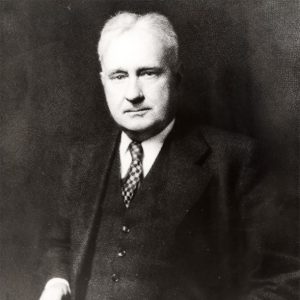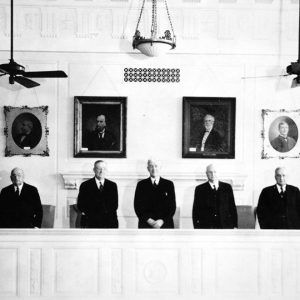calsfoundation@cals.org
Edgar Lafayette McHaney (1876–1948)
Edgar McHaney contributed to legal proceedings that changed constitutional law in the United States. With co-counsel Scipio Africanus Jones, he appealed the convictions of twelve men convicted of murder after the 1919 Elaine Massacre. The case of six of the men, Moore v. Dempsey, was eventually heard by the U.S. Supreme Court, and a precedent-setting decision allowed federal courts to override state appellate courts if constitutional rights were denied. McHaney also served for a short time in the Arkansas House of Representatives before a long tenure on the Arkansas Supreme Court.
Born on November 6, 1876, in Gibson, Tennessee, Edgar Lafayette McHaney was one of nine children of William W. McHaney and Mary Ellen Hicks McHaney. He grew up on a farm, attending public schools. He graduated from Southern Normal University in Huntingdon, Tennessee, and became a teacher and principal in Arkansas schools in DeWitt (Arkansas County) and Piggott (Clay County). He moved to Little Rock (Pulaski County) and, while working as an assistant to the secretary of state from 1902 to 1908, completed night law school. He was admitted to the bar, entering private practice in Little Rock.
On April 20, 1904, he married Gail Myers, a school teacher in Piggott. They had six children, one of whom, James M. McHaney, gained fame as a prosecutor in the Nuremburg trials of Nazi war criminals after World War II.
Edgar McHaney became a partner in Murphy, McHaney and Dunaway. The senior partner, George Murphy, was a noted trial lawyer.
The Elaine Massacre was a riot that began on September 30, 1919, after shots were fired between white men and black men outside of a Progressive Farmers and Household Union meeting in Hoop Spur (Phillips County), three miles north of Elaine (Phillips County). White mobs entered Elaine to put down a supposed black insurrection. Numerous African Americans (100–200, according to historian Grif Stockley) and five white men were killed; in addition, 285 African Americans were arrested during the riots. Following the Elaine Massacre, brief trials in Helena (Phillips County) resulted in twelve black men being convicted of the murders of the five white men and sentenced to death. Sixty-five black men were convicted of crimes from second-degree murder to nightriding and sentenced to prison terms. No white men were accused of crimes.
Scipio Jones formed a group to raise funds to appeal the convictions. The National Association for Advancement of Colored People (NAACP) in New York hired George Murphy, McHaney’s partner, to appeal the convictions, and Murphy and Jones then worked together.
In 1920, the Arkansas Supreme Court granted a new trial due to a technical flaw in the jury verdict for six of the condemned men, known as the Ware defendants. The men were convicted again in the retrial, but on appeal the Arkansas Supreme Court ordered yet another trial due to lack of minorities on the juries. George Murphy died, and McHaney took over the case as co-counsel with Scipio Jones. In 1923, upon appeal by McHaney, the Ware defendants were released by the Arkansas Supreme Court because the prosecution had postponed the retrial several times, not holding it within the time required by law.
The other six condemned men, known as the Moore defendants, were facing execution on Friday, June 10, 1921. Two days before the execution, McHaney persuaded Pulaski County chancery judge John Martineau to issue an injunction. The state protested, citing lack of jurisdiction, but the Arkansas Supreme Court granted a hearing, postponing the electrocutions. The defendants lost, and another execution date was set. The defendants were within a week of electrocution when a federal judge agreed to a hearing, thus staying the executions. That court ruled against the defendants, but defense counsel appealed to the U.S. Supreme Court in Moore v. Dempsey. McHaney had succeeded in obtaining surprising affidavits from two white men who participated in the violence. One admitted to shooting an unarmed black man, and both told of the torture of black prisoners in the Helena jail to coerce confessions or testimony against others.
In 1923, based in part on the affidavits, the Court gave a landmark decision in favor of the defendants, with the majority opinion by Justice Oliver Wendell Holmes. The case was remanded to federal district court for evidentiary hearing. The prosecution did not pursue the case in federal court. Contrary to previous decisions, the Court decided that, despite a state appellate court’s ruling, if constitutional rights were denied, then a case could be challenged in federal court. The Moore v. Dempsey decision was a change in constitutional law that has stood since that time and is studied in some law school curricula. In January 1925, after negotiations by Jones, Governor Thomas McRae granted the Moore defendants and other remaining prisoners “indefinite furloughs.” They were released and never re-arrested or retried.
McHaney, even though involved in this controversial case, was elected to the Arkansas House of Representatives in 1921, retiring after one term. He was appointed to the Arkansas Supreme Court in 1927 and was elected to successive terms, serving for twenty-one years. In his tenure on the court, McHaney wrote 1,260 opinions, heard thousands of cases, and was a respected jurist.
His first opinion was in 1927, in Bush v. Martineau, involving highway financing. His majority opinion has been cited more than 100 times. His 1930 majority opinion in Robinson v. Holman held that the Arkansas Democratic Party had the right to exclude African Americans from voting in party primary elections, given that such parties were private organizations; the U.S. Supreme Court refused to hear an appeal of that case but years later ruled such restrictions unconstitutional. The 1935 McHaney opinion in Clayton, et al. v. State denied reversal of African-American indictments by a grand jury that excluded black members, because there was no record in the trial court of such exclusion.
McHaney was active in the community and in fraternal organizations. He was a member of the Elks, Eagles, Knights of Pythias, and Freemasons. He was active in the Democratic Party and the Baptist Church. He was an avid hunter, fisherman, and conservationist. He was elected national president of Ducks Unlimited, and a lake in a wildlife conservation program in Canada was named in his honor.
He died in Little Rock on May 29, 1948, after suffering a stroke. State flags were flown at half mast and state offices were closed for his funeral.
For additional information:
Grif Stockley Collection. Butler Center for Arkansas Studies, Central Arkansas Library System. Little Rock, Arkansas.
Herndon, Dallas T. Centennial History of Arkansas, Vol. 3. Chicago: S. J. Clarke Publishing Company, 1922.
Satterfield, W. W. “Edgar McHaney: Supreme Court Justice and Elaine Attorney.” Pulaski County Historical Review 67 (Summer 2019): 30–40.
Stockley, Grif, Brian K. Mitchell, and Guy Lancaster. Blood in Their Eyes: The Elaine Massacre of 1919. Rev. ed. Fayetteville: University of Arkansas Press, 2020.
Whitaker, Robert. On the Laps of Gods: The Red Summer of 1919 and the Struggle for Justice that Remade a Nation. New York: Crown, 2008.
W. W. Satterfield
Little Rock, Arkansas
 Civil Rights and Social Change
Civil Rights and Social Change Early Twentieth Century, 1901 through 1940
Early Twentieth Century, 1901 through 1940 Law
Law Edgar L. McHaney
Edgar L. McHaney  Supreme Court of Arkansas, 1942
Supreme Court of Arkansas, 1942 



Comments
No comments on this entry yet.